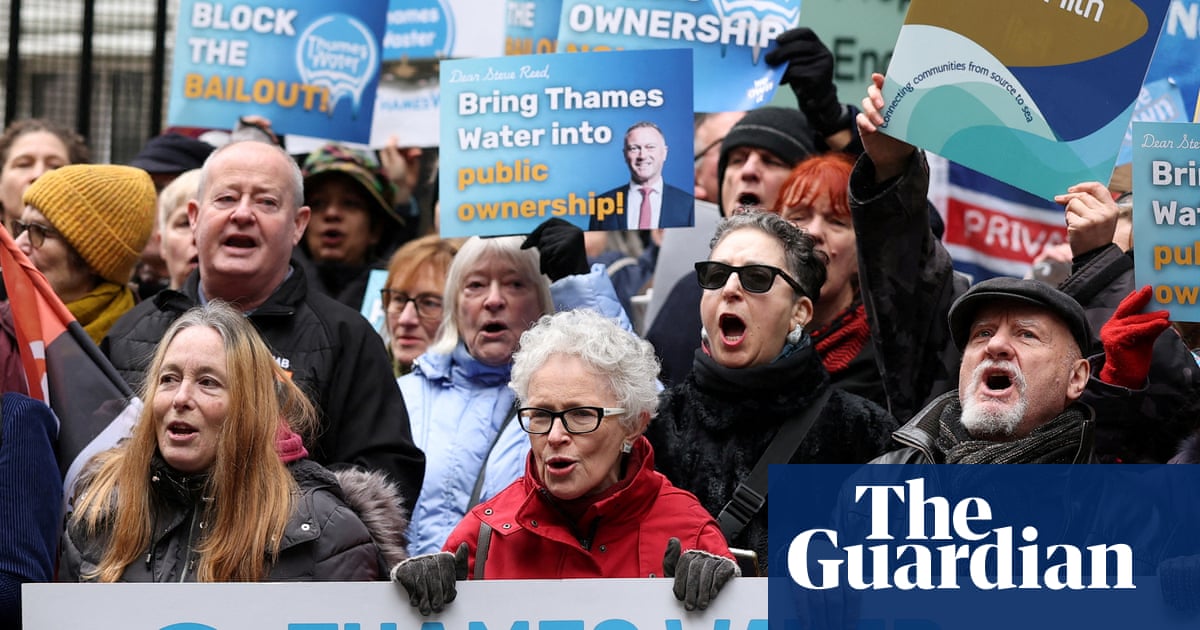The chair ofThames Waterhas admitted its finances were “hair raising”, as he said bosses were in line for “substantial” bonuses linked to an emergency £3bn loan.
The UK’s biggest water company came within just five weeks of running out of money, Adrian Montague told MPs on Tuesday.
“Thames in the last year has come very close to running out of money entirely,” he said. He added there were times where it only had weeks’ worth of cash left. “Running a £20bn corporation on five weeks’ liquidity, honestly, it’s hair raising.”.
Montague also said some executives at the struggling water company were in line for payouts amounting to “50% of salary, very substantial bonuses” as part of the high-interest emergency debt package, which wasapproved by the high court in February.
Bosses at the heavily indebted supplier, which has 16 million customers and 8,000 employees, faced a grilling from MPs amid public outrage over the costs and operation of water companies, andThames in particular.
Thames’ chief executive, Chris Weston, was also asked to justify his bonus of £195,000 for three months of work after he joined the company in January 2024.
“It was not the reason, but it was a reason for me joining Thames. Fundamentally, I joined Thames because it matters to society,” Weston said. “Within the first three months I did make a difference.”
Weston’s bonus could amount to as much as 156% of his pay, compared with 3-6% for frontline workers, he said.
As concerns grows within Whitehall and Westminster overthe rising risk of drought this summer, Weston said the company was “confident” it would not run out of water. Still, he could not rule out a hosepipe ban or other restrictions in the summer months if the trend of low rainfall continued.
The government could face £5bn of extra costs if ThamesWaterwere to fall into the special administration regime (SAR) – a form of temporary nationalisation – Montague told MPs.
“A SAR would make life extremely difficult for everyone,” he said. Suppliers and staff may walk away from the company and the “burden on government would be considerable”.
“That’s what happened in Railtrack”, he added – to datethe largest nationalisation.
Montague told MPs on the environment select committee that he wanted to apologise for “letting customers down” in recent years and at times causing people “real hardship”.
Weston said the company was going through a process of making sure assets were available, reservoirs were as full as possible and critical maintenance was carried out “so we are as prepared as best we can be for a drought”, but water restrictions could not be ruled out.
He said: “I am confident we won’t run out of water. I’m not confident we won’t have to restrict usage, because that will depend on what the weather does and what rainfall happens between now and the summer.”
Montague also hit back at criticisms of havingonly a single bidder left in the raceto buy Thames, saying it was more cost effective.
The US private equity firm KKR, whichhopes to acquire a £4bn stake, is the last option for Thames as it scrambles to find a buyer by the end of June. Ofwat, the industry regulator, had said it would prefer two companies to be in the final phase of checks before a bid was picked, MPs said.
“We are being swamped by KKR people,” Montague said, adding that this was a “good sign”.
Weston said: “There’s no guarantee we would not stay on a market-led solution as opposed to a special administration, but it is a very fluid situation and those are all possibilities.”
The committee chair, Alistair Carmichael, said: “Our hearing with Thames Water bosses this morning raised real concerns about the company’s commitment to transparency and accountability to its customers.
“Alarm bells are ringing about the processes underpinning its proposed takeover bid by KKR and the potential for a corporate stitch-up that benefits those at the top and fails to deliver for customers and the environment.”
